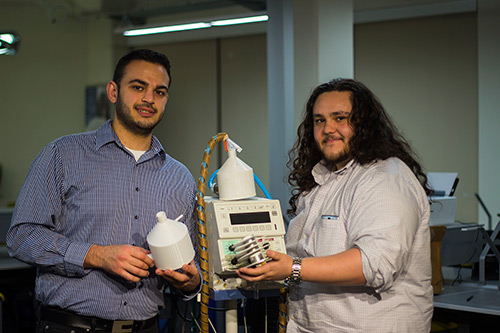
 As a senior engineering student, Michael Urner selected a capstone project he related to.
As a senior engineering student, Michael Urner selected a capstone project he related to.
Little did he know that his 2013 Innovation and Design Clinic (IDC) project would lead him to start his own companies through the UC Merced Venture Lab and patent his team’s work — equipment that could save the lives of premature newborns.
IDC “capstone” projects are a big part of the annual Innovate to Grow competition, held each year in May. Innovate to Grow highlights IDC, Engineering Service Learning and Mobile App Challenge teams that have worked with sponsors from among the business and nonprofit communities to solve real-world problems. This year’s Innovate to Grow events take place May 13, although the Mobile App Challenge semifinals are Saturday (April 30).
In some cases, like Urner’s, the team projects lead to long-term collaborations with industry partners and the Venture Lab, a program of the UC Merced Office of Business Development, which helps nurture the entrepreneurial spirit the students might not even know they harbor.
“We have a lot of people with big ideas who want to build something, but they don’t know how to get started,” said Cara Baird, a business development associate with the Office of Business Development.
Often, it starts with a seed of an idea.
Urner was drawn to a project that had to do with respiratory issues because he has asthma. He and his IDC team partnered with Valley Children’s Hospital, which sought a cleaner, safer, more efficient humidifier for neonatal ventilators.
Babies born prematurely tend to suffer a suite of illnesses and issues, including respiratory problems. They often lack the linings that protect their fragile lungs from cracking and becoming infected.
The equipment most widely used to humidify their incubators contributes to the problem because it builds up condensation and water plugs — blockages of warm water where bacteria thrive and make their way into babies’ lungs through the respirators, resulting in ventilator-associated pneumonia.
The team was part of the 2013 Innovate to Grow competition, and though the project didn’t win, Urner and teammate Paul Bargouth weren’t done with it. They formed a startup called St. Vincent’s Solutions and recently received a U.S. patent on their clean humidifier.
Some Innovate to Grow teams continue working with their sponsoring businesses, solving problems as they arise. Others create startups like St. Vincent’s and BEAT. As of now, there are 26 startup teams working through the Venture Lab on everything from robot-assisted agriculture to a system used in manufacturing plants to predict when machinery needs maintenance.
The Venture Lab will be watching the 24 IDC, 11 Engineering Service Learning and 35 Mobile App Challenge teams at this year’s Innovate to Grow competition.
“These programs are a showcase for innovations that promise a better future,” said Peter Schuerman, associate vice chancellor for Research and Economic Development and director of the Venture Lab. “Through the Venture Lab, we use entrepreneurship to deliver on that promise.”
The day-long event is open to the public in various locations on campus, so anyone who wants to see the innovative solutions students have devised is welcome to attend.
“The Venture Lab is the segue if they want to keep working on their projects,” Baird said. “IDC and Innovate to Grow put them on a deadline to create working models, but we connect them with the office space, mentorship and legal and business consulting resources they need to take these projects to the next level.”
The Office of Business Development’s goal is to help improve the area’s economy by fostering startups and finding entrepreneurs who want to partner with students and faculty members, and helping existing businesses grow by introducing them to researchers at UC Merced whose work can be applicable. The office acts as the agent between researchers and industry.
“Large corporations used to have research and development departments, but have scaled back their research activities to emphasize development,” Baird said. “UC Merced can provide the research to complement their focus on development.”
Urner said he and Bargouth probably wouldn’t be where they are now without the IDC, Innovate to Grow and the Venture Lab. They are hoping to market the humidifiers and use any profits to help develop a whole line of hospital appliances.
“Our whole goal is to make hospitals cleaner, safer places,” Urner said.
Lorena Anderson

Senior Writer and Public Information Representative
Office: (209) 228-4406
Mobile: (209) 201-6255






